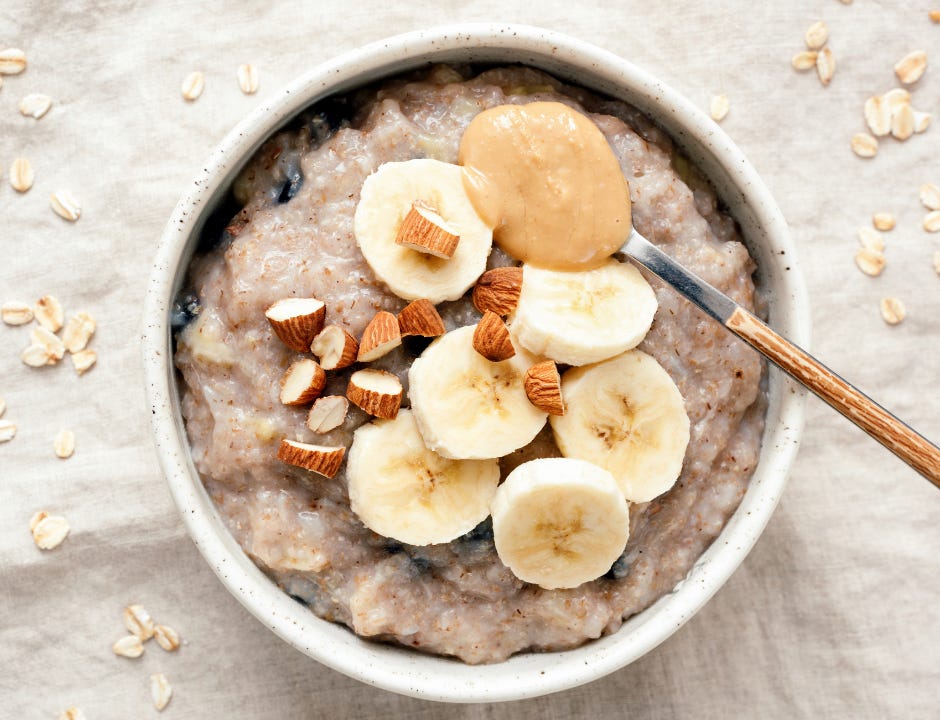Intermittent Fasting During Perimenopause - Should We or Not?
Over the years, I’ve had many different breakfast phases - most notably the Bircher muesli era, and then, during my time in London, I was all over porridge. I loved oats so much that I even needed a warm, comforting bowl right before bed. It was basically my pre-CBD, pre-progesterone sleeping aid, and I was convinced that I couldn’t sleep without it.
Until one day my body rebelled. My heart started racing so badly after breakfast that I had to lie down. It’s been like this ever since - so no more porridge for me.
While I was still experimenting with alternatives, intermittent fasting came up, and my girlfriends started raving about how great they felt skipping breakfast. Always happy to experiment, I gave it a go, and I didn’t like it at all.
I pushed through until noon with a few extra coffees, and when I finally allowed myself to eat, I was ravenously hungry and overate. I decided IF wasn’t for me and parked it until many years later.
Fast forward to now - I’ve mastered intermittent fasting. I finish dinner around 8 pm and fast until about 10 am - a good four hours after waking up, sometimes even longer. I’m comfortable doing my workouts on an empty stomach - even strength training - and I love sitting down afterwards with a big protein smoothie.
All my clients do the same because they understand the importance of a solid, protein-rich breakfast once I explain how delicate our hormone system is. It so easily tips into the wrong direction when it gets too much sugar or when we start eating too late.
Until recently, my advice was to start eating no later than 11 am.
And then I read Dr Stacey Sims’ latest book Next Level - and everything I do, teach, and believe in (when it comes to fasting) has been turned on its head.
In her book and many podcast appearances, she vehemently advises against intermittent fasting for active women, highlighting that most supporting research is based on sedentary, obese men or postmenopausal women. Active women have different physiological needs, she says, and fasting can negatively impact our hormonal balance and metabolism.
She’s also not a big fan of exercising on an empty stomach because it can lead to increased cortisol levels and muscle breakdown (shock - horror), hindering not just performance but also recovery.
To be clear, I’m not just following any random advice I come across - but when Dr Sims speaks, I listen. She is an exercise physiologist and nutrition scientist renowned for her pioneering work in female-specific training and nutrition. She’s written over 100 peer-reviewed scientific papers and held research positions at leading universities. All this to say, she’s not a lightweight in this area.
But what now? Should we stop intermittent fasting and go back to eating breakfast as soon as we get up? Stop lifting heavy weights with nothing but green tea in our system? I’m not opposed to that thought.
Here’s what I did with Dr Sims’ recommendations:
I have a small amount of protein before exercise to give my body more energy for my workout. Nothing ridiculous - just a cup of bone broth with a tablespoon of collagen. That’s about the amount of protein recommended based on the latest research.
As soon as I finish my workout and have had a shower, I eat my usual protein-rich breakfast, which includes a small portion of carbs for energy and hormone balance.
I still fast intermittently (yep) but I moved my eating window forward. I now eat from around 8 am until 6/6.30 pm. That’s still 13-14 hours - but much more friendly for our female metabolism.
Otherwise, I eat the same as usual.
Here’s what happened after doing this for a month:
After the initial mainly psychological hurdle to eat earlier, my tummy now starts growling around 8 am expecting to be fed.
I sleep much better after an earlier dinner.
My weight dropped by about 2 kilos.
My body fat dropped by 1%.
My skeletal muscle increased slightly.
While this could be normal fluctuations, it’s still a promising trend. I’ll continue and monitor my new fasting regime and will report back.
So, it’s all about fuelling up in the morning and keeping it light later in the day.
There’s a German saying: „Frühstücke wie ein Kaiser, iss zu Mittag wie ein König und zu Abend wie ein Bettelmann.“ (= "Eat breakfast like an emperor, lunch like a king, and dinner like a beggar.") – looks like they knew it all along!
So what does this mean for your own fasting routine?
As you can see, I continually test, tweak, and update my approach based on the latest research – I’m a bit of a health and data nerd.
The good thing is, if I do it you don’t have to be the guinea pig or spend your Sunday evenings deciphering scientific papers.
If you’re navigating perimenopause and feeling frustrated by weight gain, hormonal chaos, and all the conflicting advice out there, check out the Bloom Club membership. It includes my signature weight loss program where you’ll learn exactly how to fuel your body for real fat loss, balanced hormones, and lasting energy – without giving up dessert or spending hours in the gym.
👉🏻 Check out the Bloom Lab Membership here ↓






